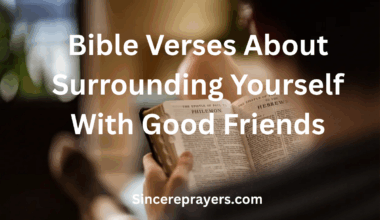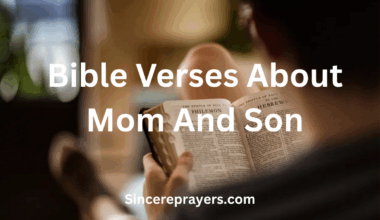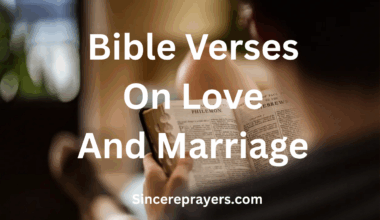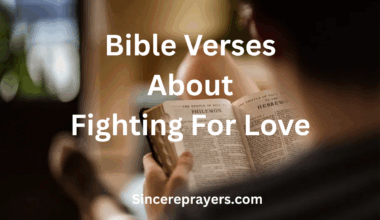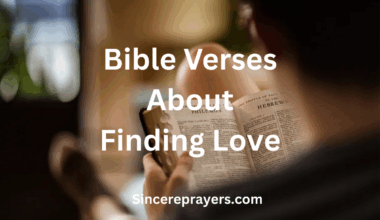God gives us relationships because they are supposed to enrich our lives with love, happiness, and companionship. However, even the strongest ties can become stretched, broken, or painful due to human frailties. Relational wounds pierce the psyche severely, whether they are caused by marital difficulties, family disputes, or friendships put to the test by treachery. It frequently seems impossible to achieve calm again when harsh words are exchanged or trust is betrayed.
The good news is that Scripture provides significant insight, direction, and consolation for relationships that are healing. God is aware of our difficulties in communicating, forgiving, and making amends. Numerous instances of broken relationships being repaired by His power may be found in the Bible verses about healing relationships, such as Joseph forgiving his brothers, Jesus making peace between humanity and God, and Paul exhorting the church to live in harmony. Every verse demonstrates that even the most severe wounds can be healed with God’s assistance.
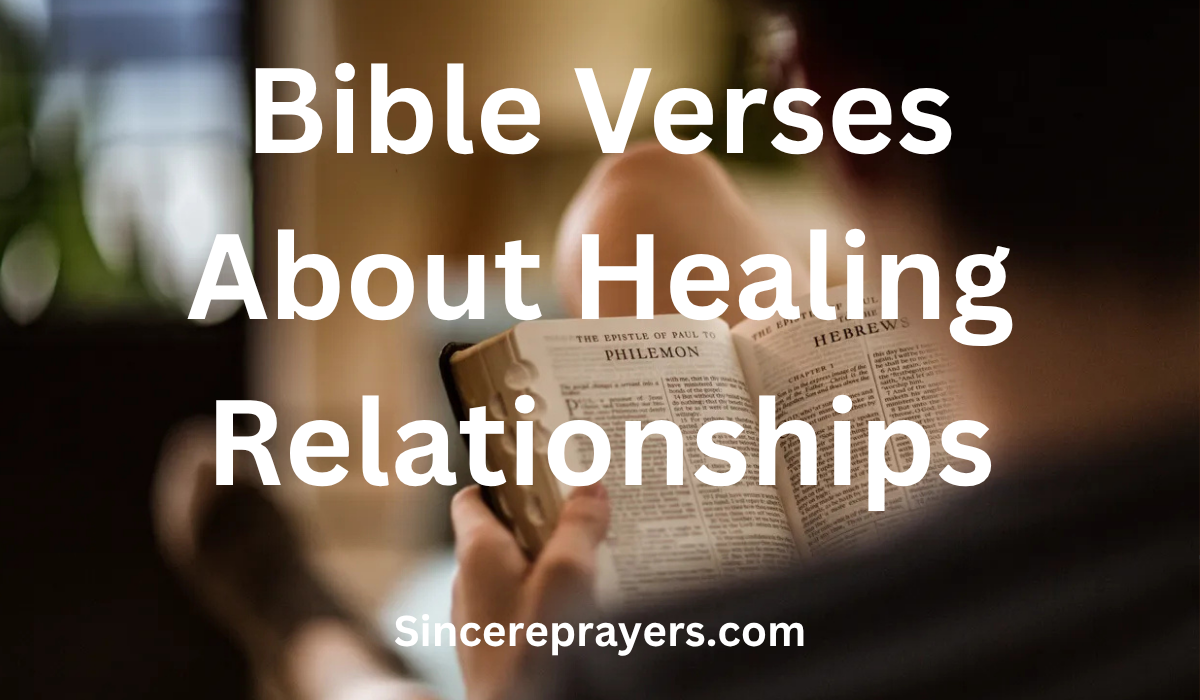
It is not enough to ignore the hurt or act as though the argument never occurred in order to mend a relationship. It entails preferring love above pride, choosing forgiveness over resentment, and enlisting God in the process. Sometimes patience and humility are needed. At other instances, it necessitates prayer and the bravery to initiate the process of reconciliation. The Bible verses about healing relationships reminds us that forgiveness is a mandate that reflects God’s mercy toward us and is not an option for believers.
35 potent Bible passages about mending relationships will be examined in this post; each one provides insight into God’s plan for love, forgiveness, and reconciliation. These passages act as spiritual medicine, assisting us in letting go of resentment, embracing harmony, and fortifying our relationships. These Scriptures provide you the hope and encouragement you need to pursue healing, whether your goal is to mend a marriage, make amends with a friend, or bring peace back to your family.
35 Inspiring Bible Verses About Healing Relationships in 2025
1. Proverbs 17:9
“Whoever would foster love covers over an offense, but whoever repeats the matter separates close friends.”
This verse emphasizes the importance of forgiveness in relationships. Love chooses to let go of offenses rather than dwell on them or spread them to others. By overlooking mistakes, we protect the bond of friendship and family ties. Holding onto grudges, however, creates division and distance. Healing relationships requires a heart willing to forgive and move forward in love, rather than repeatedly bringing up past wrongs.
2. Matthew 5:9
“Blessed are the peacemakers, for they will be called children of God.”
Jesus calls us to be peacemakers, not peacekeepers. This means actively seeking reconciliation and healing in relationships, even when it’s difficult. Peacemaking reflects God’s nature because He Himself reconciled us to Him through Christ. When we step into broken relationships with humility, love, and a willingness to forgive, we demonstrate God’s character and earn the title of His true children.
3. Ephesians 4:32
“Be kind and compassionate to one another, forgiving each other, just as in Christ God forgave you.”
Forgiveness is the foundation of healing relationships. This verse reminds us that our willingness to forgive flows from God’s forgiveness of us. Just as Christ showed mercy despite our failures, we are called to extend grace to those who hurt us. Compassion and kindness restore what anger and resentment destroy. Healing begins when forgiveness is offered with genuine love.
4. Colossians 3:13
“Bear with each other and forgive one another if any of you has a grievance against someone. Forgive as the Lord forgave you.”
This verse underscores the importance of patience and forgiveness in relationships. Conflicts are inevitable, but God calls us to bear with one another rather than quickly give up. True healing happens when we release grievances and forgive in the same way the Lord forgave us—fully and freely. This act of grace restores trust and deepens bonds.
5. James 5:16
“Therefore confess your sins to each other and pray for each other so that you may be healed. The prayer of a righteous person is powerful and effective.”
Honest confession is key to relational healing. When we admit our faults and seek forgiveness, we open the door for reconciliation. Prayer then becomes the spiritual glue that restores broken bonds. James reminds us that prayer not only heals physical sickness but also emotional and relational wounds. Healing comes when we practice humility, honesty, and intercession for one another.
6. Romans 12:18
“If it is possible, as far as it depends on you, live at peace with everyone.”
Paul encourages believers to do everything within their power to live in peace with others. While not every relationship can be perfectly restored, God calls us to take responsibility for our part. Healing begins when we choose peace over conflict, humility over pride, and love over retaliation. Even when others resist reconciliation, our commitment to peace reflects Christ’s heart.
7. 1 Peter 4:8
“Above all, love each other deeply, because love covers over a multitude of sins.”
Love is the most powerful tool for healing relationships. Peter reminds us that genuine, deep love has the capacity to cover faults, mistakes, and failures. Instead of focusing on shortcomings, love chooses to forgive and move forward. This doesn’t excuse sin but fosters grace that rebuilds trust. Deep love acts as a healing balm that softens hardened hearts and restores fractured bonds.
8. Matthew 18:15
“If your brother or sister sins, go and point out their fault, just between the two of you. If they listen to you, you have won them over.”
Jesus teaches the proper way to address conflict—with private, respectful conversation. Instead of gossip or public confrontation, He calls us to approach others directly and with humility. This method protects relationships from unnecessary harm while promoting reconciliation. Healing happens when conflicts are resolved in honesty and love, with the goal of restoration rather than winning an argument.
9. Proverbs 15:1
“A gentle answer turns away wrath, but a harsh word stirs up anger.”
Our words carry the power to either heal or hurt relationships. Proverbs reminds us that gentleness can de-escalate tension and open the door to reconciliation. Harsh words, however, inflame conflict and deepen division. Healing relationships requires not only forgiveness but also wisdom in communication. Speaking gently invites peace, calms anger, and sets the tone for reconciliation rooted in grace.
10. Luke 6:37
“Do not judge, and you will not be judged. Do not condemn, and you will not be condemned. Forgive, and you will be forgiven.”
Healing relationships requires letting go of judgment and condemnation. Jesus teaches that the measure we use toward others will be measured back to us. When we choose forgiveness over criticism, we not only repair broken relationships but also experience God’s mercy in return. Forgiveness paves the way for freedom, releasing both us and others from the bondage of bitterness.
11. Mark 11:25
“And when you stand praying, if you hold anything against anyone, forgive them, so that your Father in heaven may forgive you your sins.”
Jesus ties forgiveness in relationships to our own forgiveness from God. When we harbor bitterness, it hinders both healing and spiritual growth. Releasing offenses through forgiveness not only restores relationships but also keeps our hearts aligned with God’s mercy. Forgiveness is not optional—it is an essential act of obedience that heals wounds and restores fellowship with both God and people.
12. 1 Corinthians 13:4–5
“Love is patient, love is kind. It does not envy, it does not boast, it is not proud. It does not dishonor others, it is not self-seeking, it is not easily angered, it keeps no record of wrongs.”
Paul’s description of love provides a blueprint for healing broken relationships. True love is patient, kind, and not quick to take offense. It doesn’t keep track of failures but instead seeks restoration. When we practice this kind of love, we reflect Christ’s love for us and create an environment where reconciliation and healing can flourish.
13. Matthew 6:14
“For if you forgive other people when they sin against you, your heavenly Father will also forgive you.”
This verse reinforces the necessity of forgiveness as a foundation for healing. God’s forgiveness of us sets the standard for how we must treat others. Holding onto resentment blocks restoration, but forgiveness unlocks peace and reconciliation. Healing relationships requires a willingness to extend the same grace we daily receive from God.
14. Galatians 6:2
“Carry each other’s burdens, and in this way you will fulfill the law of Christ.”
Healing relationships often requires sharing one another’s struggles. By bearing each other’s burdens, we demonstrate compassion and empathy that restore broken trust. Walking together through pain and difficulty strengthens bonds and reflects the love of Christ. Relationships heal when we prioritize one another’s needs above our own pride.
15. Hebrews 12:14
“Make every effort to live in peace with everyone and to be holy; without holiness no one will see the Lord.”
This verse emphasizes intentional effort in pursuing peace. Healing relationships doesn’t happen by accident—it requires active choices rooted in holiness. By striving for peace, we reflect God’s heart and invite His presence into our relationships. When we choose unity over division, we create an atmosphere where reconciliation becomes possible.
16. Philippians 2:3
“Do nothing out of selfish ambition or vain conceit. Rather, in humility value others above yourselves.”
Humility is a key ingredient in healing relationships. Paul urges believers to set aside pride and self-interest in favor of honoring others. When we place the well-being of others above our own desires, reconciliation becomes possible. Humility opens the door to forgiveness, compassion, and understanding—qualities that mend broken bonds.
17. Ecclesiastes 4:9–10
“Two are better than one, because they have a good return for their labor: If either of them falls down, one can help the other up.”
This verse highlights the value of partnership and support in relationships. Healing requires us to recognize that we need one another. Brokenness can be restored when we choose to lift each other up instead of tearing each other down. True companionship reflects God’s design for mutual encouragement and strength.
18. Matthew 7:12
“So in everything, do to others what you would have them do to you, for this sums up the Law and the Prophets.”
Known as the Golden Rule, this teaching of Jesus provides a simple yet powerful principle for healing relationships. When we treat others with the same respect, forgiveness, and kindness we desire, reconciliation naturally follows. This verse calls us to empathy and selflessness as the foundation for restored harmony.
19. Romans 14:19
“Let us therefore make every effort to do what leads to peace and to mutual edification.”
Paul reminds us to actively pursue peace in relationships. Healing happens when we focus on building one another up rather than tearing each other down. Every word and action should lead to reconciliation, encouragement, and growth. Mutual edification not only strengthens relationships but also glorifies God by demonstrating His love.
20. Psalm 34:14
“Turn from evil and do good; seek peace and pursue it.”
The psalmist calls us to intentionally seek peace in every relationship. Healing does not come from passivity but from actively choosing to do good and pursue reconciliation. True peace requires effort, humility, and persistence. When we turn from harmful behaviors and embrace love, God’s healing power restores relationships and strengthens unity.
21. John 13:34
“A new command I give you: Love one another. As I have loved you, so you must love one another.”
Jesus sets the standard of love in relationships—His own sacrificial love for us. Healing begins when we model His love, choosing selflessness, compassion, and grace. This type of love heals wounds, rebuilds trust, and fosters reconciliation. When we love as Christ loved, our relationships reflect His presence and become instruments of peace and restoration.
22. 2 Corinthians 13:11
“Strive for full restoration, encourage one another, be of one mind, live in peace. And the God of love and peace will be with you.”
Paul encourages believers to actively pursue restoration in relationships. Unity and encouragement strengthen the body of Christ and reflect God’s love. Healing requires both intentional restoration and a commitment to peace. When we work toward reconciliation, God’s presence fills our relationships, bringing harmony and joy.
23. Colossians 3:14
“And over all these virtues put on love, which binds them all together in perfect unity.”
Love is the binding force that holds relationships together. Paul reminds us that without love, virtues like forgiveness and kindness lose their power. Love creates unity that withstands trials, misunderstandings, and offenses. Healing relationships begins with clothing ourselves in love daily, allowing it to cover shortcomings and foster harmony.
24. Proverbs 16:24
“Gracious words are a honeycomb, sweet to the soul and healing to the bones.”
Words can either wound or heal. Proverbs teaches that gracious, kind speech brings healing and restoration to relationships. Gentle encouragement and affirming words restore trust and soothe pain. Choosing uplifting language over harsh criticism is essential for reconciliation. Healing grows when words are seasoned with grace and love.
25. Ephesians 4:26
“In your anger do not sin: Do not let the sun go down while you are still angry.”
Conflict is natural, but unresolved anger destroys relationships. Paul urges believers to address disagreements quickly and without sin. Holding onto anger creates bitterness that damages bonds. Healing comes when we deal with issues promptly, offering forgiveness before resentment takes root. Reconciliation thrives when peace is prioritized over pride.
26. Micah 6:8
“He has shown you, O mortal, what is good. And what does the Lord require of you? To act justly and to love mercy and to walk humbly with your God.”
Healing relationships requires justice, mercy, and humility. God’s call to mercy means offering forgiveness, even when wronged. Walking humbly allows reconciliation to flourish because pride is set aside. Justice ensures fairness while mercy fosters grace. Together, these virtues reflect God’s heart and restore broken relationships.
27. Psalm 133:1
“How good and pleasant it is when God’s people live together in unity!”
Unity is God’s desire for His people. Broken relationships bring pain, but restored bonds bring joy and peace. The psalmist highlights the beauty of harmony, reminding us that healing relationships is not only beneficial for us but also pleasing to God. Unity reflects His presence and strengthens His kingdom.
28. 1 Thessalonians 5:11
“Therefore encourage one another and build each other up, just as in fact you are doing.”
Encouragement is a vital part of healing relationships. Paul instructs believers to build each other up instead of tearing one another down. Speaking life, offering support, and affirming others restores broken trust. Healing comes when we consistently choose words and actions that uplift rather than discourage.
29. Matthew 18:21–22
“Then Peter came to Jesus and asked, ‘Lord, how many times shall I forgive my brother or sister who sins against me? Up to seven times?’ Jesus answered, ‘I tell you, not seven times, but seventy-seven times.’”
Forgiveness has no limits. Jesus teaches that forgiveness is not about counting offenses but about cultivating a heart of mercy. Healing relationships requires ongoing forgiveness, even when wrongs are repeated. By forgiving continually, we mirror God’s endless grace toward us, keeping reconciliation always possible.
30. Zechariah 8:16
“These are the things you are to do: Speak the truth to each other, and render true and sound judgment in your courts.”
Truth-telling is essential for relational healing. Without honesty, reconciliation cannot take root. Zechariah calls us to speak truth with integrity, ensuring that relationships are built on trust rather than deception. Healing comes when honesty is practiced in love, restoring confidence and strengthening bonds.
31. Isaiah 1:18
“Come now, let us settle the matter,” says the Lord. “Though your sins are like scarlet, they shall be as white as snow; though they are red as crimson, they shall be like wool.”
This verse reminds us of God’s willingness to reconcile with His people despite their failures. Just as God offers forgiveness and cleansing, we are called to extend grace in relationships. Healing begins when we imitate God’s example, choosing restoration over resentment. True reconciliation reflects His heart.
32. Proverbs 27:17
“As iron sharpens iron, so one person sharpens another.”
Relationships are meant to challenge and strengthen us. While conflict may arise, it often sharpens character and builds resilience. Healing comes when we view relationships not as burdens but as opportunities for growth. By working through differences with grace, we refine one another and build stronger, healthier bonds.
33. 2 Timothy 2:24
“And the Lord’s servant must not be quarrelsome but must be kind to everyone, able to teach, not resentful.”
Paul calls believers to respond with kindness instead of quarrels. Healing requires gentleness, patience, and a refusal to dwell in resentment. By avoiding unnecessary conflict and showing kindness, we cultivate an environment where reconciliation can take place. Godly character paves the way for healing relationships.
34. John 15:12
“My command is this: Love each other as I have loved you.”
Jesus commands us to love with the same sacrificial love He displayed. Healing relationships often means giving up pride, comfort, or even our own rights to pursue reconciliation. This love is unconditional and selfless, reflecting Christ’s example. Such love heals deep wounds and restores unity.
35. 1 John 4:20
“Whoever claims to love God yet hates a brother or sister is a liar. For whoever does not love their brother and sister, whom they have seen, cannot love God, whom they have not seen.”
John makes it clear that our love for God is reflected in how we treat others. Healing relationships is not optional—it’s evidence of genuine faith. Hatred and bitterness have no place in a believer’s life. By choosing forgiveness and love, we demonstrate authentic devotion to God and nurture reconciled relationships.
Conclusion
One of the most difficult yet rewarding paths we may pursue is relationship healing. Although brokenness causes scars, God’s Word tells us that when we put our faith in His strength and wisdom, reconciliation is possible. These verses serve as a reminder that the foundation of healing is love, forgiveness, humility, and patience. In addition to mending our own wounds, God gives us the tools we need to heal others by fostering relationships based on grace.
These 35 verses demonstrate that relational healing involves more than just settling disputes; it also entails modeling Christ’s behavior. Divine directives that bring harmony back include telling the truth in love, choosing peace over conflict, and forgiving others as God has forgiven us. Broken relationships can be strengthened when we humble ourselves, put aside our selfishness, and rely on God’s Spirit. Love and reconciliation-filled relationships exalt God and make us feel incredibly happy.
Take solace in the knowledge that God is both willing and able to mend what seems irreparable if you’re currently dealing with a shattered relationship. Go over these verses in prayer, seek His direction, and be prepared to move toward peace and forgiveness. God can mend relationships beyond your wildest expectations with perseverance, prayer, and faith, even though healing might not happen right away. Have faith in Him, show mercy, and allow His love to serve as the cornerstone of all reconciliations.
